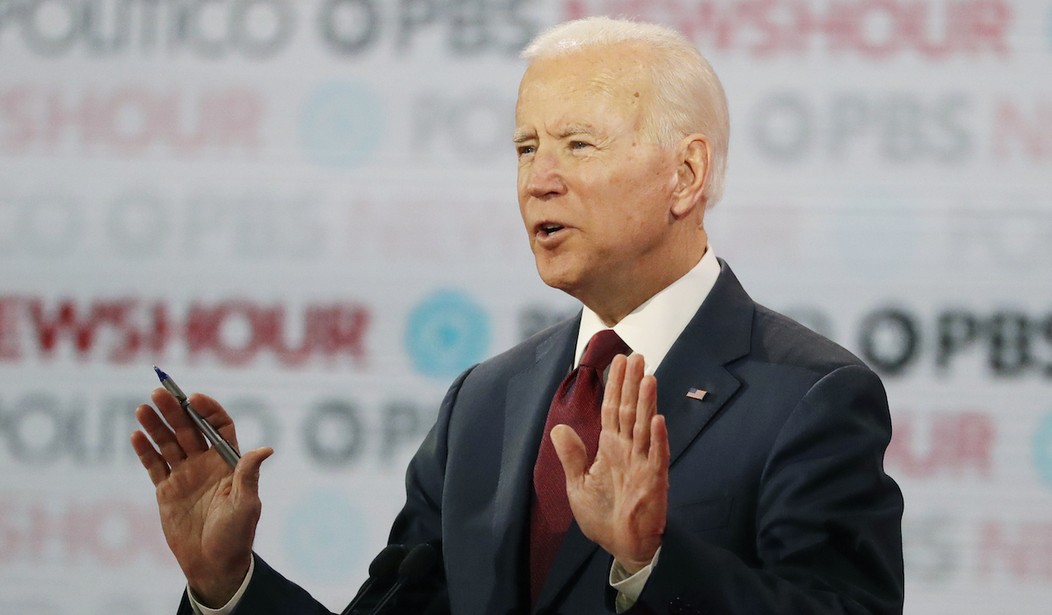On March 25, Tara Reade, a former Senate staffer for Joe Biden, made a disturbing accusation about her old boss. She claimed in a podcast episode with Katie Halper of Rolling Stone that then-Sen. Biden sexually assaulted her in a secluded area of the Capitol in 1993, pushing her against a wall, trying to kiss her and penetrating her with his fingers.
Like many accusers, Reade cannot prove this happened. The Biden campaign quickly denied it. "Women have a right to tell their story, and reporters have an obligation to rigorously vet those claims," deputy campaign manager Kate Bedingfield said in a statement. "We encourage them to do so, because these accusations are false."
But are those obligated reporters rigorously vetting these claims? Are reporters pounding the pavement and incessantly droning on their cellphones over this? There's no sign of any of that.
The networks haven't said a single word about them ... even as Biden did an hourlong town hall on CNN, interviews on NBC and MSNBC and then more interviews on CNN and MSNBC. So in the week after the allegations emerged, Biden was asked 55 questions but not one about this accusation. But NBC's Chuck Todd asked Biden whether President Donald Trump has "blood on his hands" for his response to the coronavirus pandemic.
The networks clearly believe there should be a presumption of innocence, and that the mere launch of these charges can unfairly sully an image. The fact that this accusation emerged from a sketchy source like Rolling Stone underlines that. Journalists appear to be very sensitive ... when the target is a Democrat. How can they fail to see the double standard?
Recommended
This was not the standard for Brett Kavanaugh during his Supreme Court confirmation hearings in 2018. The broadcast networks offered more than 300 minutes to several accusers who told wild stories of Kavanaugh's sexual assaults during his teenage years that could not be proved in any way. Christine Blasey Ford couldn't manage to offer a time or a place of her alleged assault -- less information than Reade offered. But she instantly became a profile in courage, cemented as a "historic figure."
During the hearings, the accusers were warmly embraced (metaphorically) by one Joe Biden. "For a woman to come forward in the glaring lights of focus, nationally, you've got to start off with the presumption that at least the essence of what she's talking about is real," he said.
There's nothing on the Biden story on NPR -- the proud purveyor of Anita Hill's unproven accusations against Supreme Court Justice Clarence Thomas -- and nothing on The New York Times. Two years ago, The Times somehow found space for a story that claimed Kavanaugh threw ice cubes at a man in a bar scuffle while attending Yale.
There's no evidence of investigative journalism from The Washington Post, which first published Ford's incredibly vague accusations. As Kavanaugh was being aggressively prosecuted and accusations arose about the Post cooperating with a Democratic plot to derail Kavanaugh, executive editor Martin Baron protested saying, "The conspiracy theories are pure nonsense." As the late Wes Pruden used to say, there wasn't a conspiracy, just a consensus.
In 2016, The Post was first to jump on the 2005 "Access Hollywood" tape in which Donald Trump assaulted no one but bragged about how he could assault women because he was a TV star. The paper waited about five hours before publishing the story. It seemed like the entire political elite -- Republican and Democratic -- was demanding Trump drop out of the presidential race immediately.
Where are all these people now that Biden is in the dock? Absent. Apathetic. Callously indifferent. Out to lunch, never to return? #MeToo dies in darkness.
Tim Graham is director of media analysis at the Media Research Center and executive editor of the blog NewsBusters.org.

























Join the conversation as a VIP Member